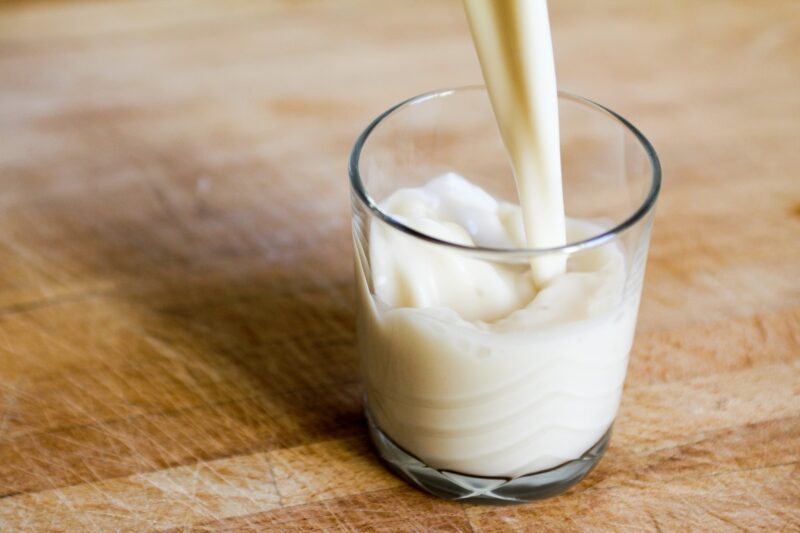Skim milk is a popular dairy product that has been a subject of debate among vegans. While it is made from cow’s milk, which is an animal product, the process of skimming the milk removes the majority of the milk fat. This raises the question of whether skim milk can be considered vegan-friendly. Let’s dive into the facts and uncover the truth about whether skim milk can be included in a vegan diet.
Key Takeaways:
- Skim milk is derived from cow’s milk and is not suitable for those following a strict vegan diet.
- There are several vegan-friendly milk alternatives available, such as soy milk, almond milk, and oat milk.
- Skim milk is lower in calories and fat compared to whole milk, but it may not provide the same nutritional benefits.
- For a milk to be considered vegan-friendly, it must be made from plant-based ingredients.
- A vegan diet can be healthy and nutritious with a focus on whole plant-based foods and a variety of protein sources.
Understanding Skim Milk and Dairy Alternatives
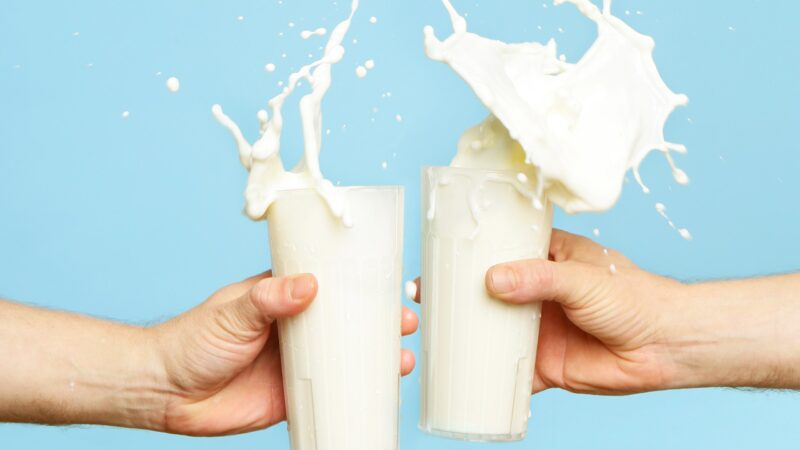
Skim milk, derived from cow’s milk, is not considered a plant-based milk alternative. However, there are numerous vegan-friendly milk options for those seeking dairy alternatives. Plant-based milk substitutes such as soy milk, almond milk, and oat milk are excellent choices. These alternatives are made from non-dairy ingredients and provide a suitable option for individuals following a vegan diet.
When looking for dairy-free milk options, it’s important to choose products that are specifically labeled as “vegan” or “dairy-free.” These plant-based milk choices offer a similar taste and texture to traditional cow’s milk, making them an easy and delicious switch for those transitioning to a vegan or dairy-free lifestyle.
“Plant-based milk substitutes such as soy milk, almond milk, and oat milk are excellent alternatives for those seeking dairy alternatives.”
Milk Options Comparison
| Milk Options | Taste | Texture | Nutritional Profile |
|---|---|---|---|
| Soy Milk | Mild and slightly nutty | Smooth and creamy | High in protein, calcium, and vitamin D |
| Almond Milk | Mild and slightly sweet | Light and thin | Low in calories, fortified with calcium and vitamin E |
| Oat Milk | Mild and slightly sweet | Creamy and thick | Rich in fiber and fortified with vitamins and minerals |
These dairy-free milk alternatives offer a wide range of flavors and nutritional benefits. Whether you’re looking for a milk substitute for your morning coffee, cereal, or baking recipes, there is a vegan-friendly option that suits your taste and dietary needs.
The Nutritional Profile of Skim Milk
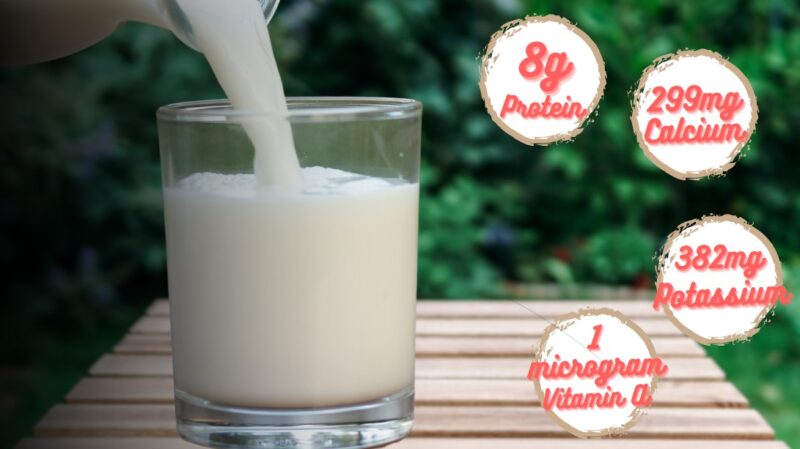
When considering the nutritional profile of skim milk, it’s important to note that while it is lower in calories and fat compared to whole milk, it does lack certain essential nutrients. Skim milk contains protein, calcium, and potassium, which are beneficial for overall health. However, the process of skimming the milk also results in the removal of fat-soluble vitamins like vitamin A and vitamin D.
To provide a clearer understanding, let’s take a closer look at the specific nutrients found in a typical serving of skim milk:
| Nutrient | Amount per Serving (1 cup) |
|---|---|
| Protein | 8 grams |
| Calcium | 299 milligrams |
| Potassium | 382 milligrams |
| Vitamin A | 1 microgram |
| Vitamin D | 0 micrograms |
As seen in the table above, skim milk still provides a decent amount of protein, calcium, and potassium. However, it’s important to note that the levels of these nutrients may vary depending on the brand and specific production process.
Is Skim Milk a Good Source of Protein?
While skim milk does contain protein, it is not considered a significant source compared to other protein-rich foods. A cup of skim milk provides approximately 8 grams of protein, which is lower than the protein content in whole milk. However, it can still contribute to your daily protein needs as part of a balanced diet.
Is Skim Milk Suitable for Vegans?
Skim milk, being derived from cow’s milk, cannot be considered suitable for vegans. Vegans strictly avoid consuming any animal-derived products, including milk and its by-products. Skim milk is essentially cow’s milk with most of its fat removed through the skimming process. Although it may be lower in calories compared to whole milk, it still comes from an animal source, making it unsuitable for a vegan diet.
It’s important to note that individuals who follow a plant-based diet but are not strict vegans may choose to include skim milk in their diet. For these individuals, the decision to consume skim milk is a personal choice and depends on their dietary preferences and beliefs.
For those following a vegan diet, there are plenty of dairy-free milk alternatives available. These alternatives, such as soy milk, almond milk, and oat milk, are made from plant-based ingredients and are suitable for vegans. They offer a similar taste and texture to cow’s milk, providing a viable option for those looking for a vegan-friendly milk substitute.
Alternatives to Skim Milk for Vegans:
- Soy milk
- Almond milk
- Oat milk
| Milk Type | Taste | Texture |
|---|---|---|
| Soy milk | Neutral, creamy | Similar to cow’s milk |
| Almond milk | Mild, nutty | Light and slightly thinner than cow’s milk |
| Oat milk | Mild, slightly sweet | Creamy and smooth |
These dairy-free alternatives are often fortified with vitamins and minerals to ensure a balanced nutritional profile. They can be used as direct substitutes for skim milk in various recipes, including coffee, cereal, and baking.
Exploring Dairy-Free Milk Options for Vegans
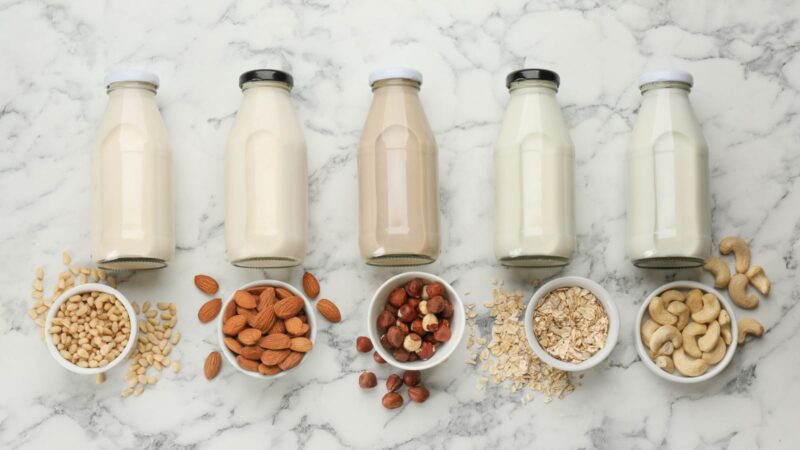
When it comes to following a vegan diet, finding suitable milk alternatives is a common concern. Luckily, there is a wide range of dairy-free milk options available for vegans. These plant-based milk substitutes offer a delicious and nutritious alternative to cow’s milk.
Dairy-Free Milk Options
One popular dairy-free milk option for vegans is soy milk. Made from soybeans, it has a creamy texture and a slightly nutty flavor. Soy milk is also a good source of protein and contains essential nutrients like calcium and vitamin D.
Another dairy-free milk alternative is almond milk. Made from ground almonds and water, it has a subtly sweet taste and a light texture. Almond milk is low in calories and is often fortified with calcium and vitamin E.
Oat milk is also gaining popularity among vegans. Made from oats and water, it has a creamy consistency and a mild taste. Oat milk is naturally sweet and is often enriched with vitamins and minerals.
Choosing the Right Milk Substitute
When selecting a dairy-free milk alternative, it’s important to consider your taste preferences and nutritional needs. Each milk substitute has its unique flavor profile and nutrient composition.
If you’re looking for a milk substitute with a similar taste to cow’s milk, soy milk is a great option. It has a rich and creamy texture that can be easily incorporated into recipes and beverages.
For those with nut allergies or who prefer a lighter flavor, almond milk or oat milk may be more suitable. Both options are versatile and can be used in various recipes, from smoothies to baked goods.
| Milk Substitute | Taste | Texture | Nutritional Profile |
|---|---|---|---|
| Soy Milk | Nutty | Creamy | High in protein, calcium, and vitamin D |
| Almond Milk | Subtly sweet | Light | Low in calories, fortified with calcium and vitamin E |
| Oat Milk | Mild | Creamy | Enriched with vitamins and minerals |
Ultimately, the choice of dairy-free milk substitute depends on your personal preferences and dietary needs. Experimenting with different options can help you find the perfect milk substitute that complements your vegan lifestyle.
Considerations for a Vegan Diet
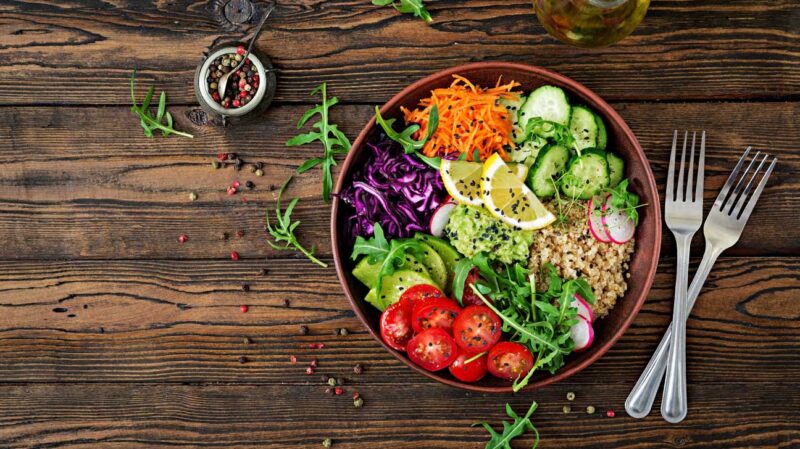
When following a vegan diet, it’s important to consider the overall nutritional balance of your meals and ensure you are getting all the essential nutrients. While skim milk may not be suitable for vegans, there are plenty of vegan milk options available that can provide the necessary nutrients found in dairy milk. These dairy-free milk alternatives are made from plant-based ingredients and offer a wide variety of flavors and textures to suit your preferences.
One popular vegan milk option is soy milk. It is rich in protein and can be used in cooking and baking just like regular milk. Almond milk is another common choice, known for its subtle nutty flavor. It is low in calories and often fortified with vitamins and minerals. Oat milk, on the other hand, has a creamy texture and is naturally sweet. It is a great source of fiber and can be a delicious addition to your morning coffee or cereal.
When choosing a dairy-free milk alternative, it’s essential to read labels and look for products that are specifically labeled as “vegan” or “dairy-free.” This ensures that the milk is free from any animal-derived ingredients and is suitable for a vegan diet. Additionally, some brands may fortify their plant-based milk alternatives with extra nutrients like calcium, vitamin D, and vitamin B12 to make them more nutritionally comparable to dairy milk.
Table: Nutritional Comparison of Vegan Milk Options
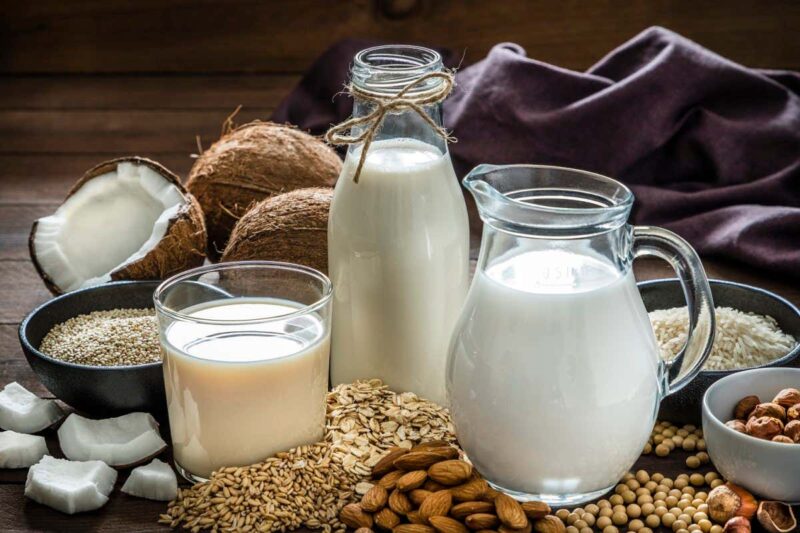
| Milk Alternative | Protein (g) | Calcium (mg) | Vitamin D (IU) | Vitamin B12 (µg) |
|---|---|---|---|---|
| Soy Milk | 7 | 299 | 119 | 2.8 |
| Almond Milk | 1 | 451 | 100 | 0 |
| Oat Milk | 3 | 350 | 0 | 1.2 |
As shown in the table above, soy milk is the highest in protein compared to almond milk and oat milk. Almond milk, on the other hand, is an excellent source of calcium. Oat milk contains some protein and is a good source of vitamin B12. However, it is worth noting that the nutritional content of these vegan milk alternatives may vary depending on the brand and any fortification added.
Ultimately, when considering a vegan diet, it’s important to choose a variety of plant-based foods that provide a balance of nutrients. While skim milk may not be suitable for vegans, there are plenty of delicious and nutritious dairy-free milk alternatives that can be incorporated into your daily routine.
Conclusion
In conclusion, it is clear that skim milk is not considered vegan-friendly. As it is derived from cow’s milk, which is an animal product, it does not align with the principles of a strict vegan diet. However, for individuals who follow a plant-based diet but are not strict vegans, the decision to include skim milk is a personal choice.
Fortunately, there are numerous dairy-free milk options available for those following a vegan lifestyle. Soy milk, almond milk, and oat milk are just a few examples of delicious and nutritious alternatives that can provide a similar taste and texture to cow’s milk.
When considering your dietary preferences and nutritional needs, it’s important to choose the milk that best suits you. Whether you opt for dairy-free alternatives or choose to include skim milk in your diet, there are plenty of options to ensure you can enjoy a healthy and fulfilling lifestyle.
FAQ
Is skim milk considered vegan?
No, skim milk is derived from cow’s milk and is not considered vegan-friendly.
What are some vegan milk options?
Popular vegan milk options include soy milk, almond milk, and oat milk.
Is skim milk dairy-free?
Skim milk is derived from cow’s milk, so it is not dairy-free.
Can vegans drink skim milk?
Skim milk is not suitable for those following a strict vegan diet.
Does skim milk provide the same nutritional benefits as whole milk?
Skim milk is lower in calories and fat compared to whole milk, but it may not provide the same nutritional benefits.
What should I consider when following a vegan diet?
It’s important to ensure you are getting all essential nutrients and consider overall nutritional balance. There are plenty of vegan milk options available.
Can a vegan diet be healthy and nutritious?
Yes, a vegan diet can be healthy and nutritious if properly planned with a focus on whole plant-based foods and a variety of protein sources.

